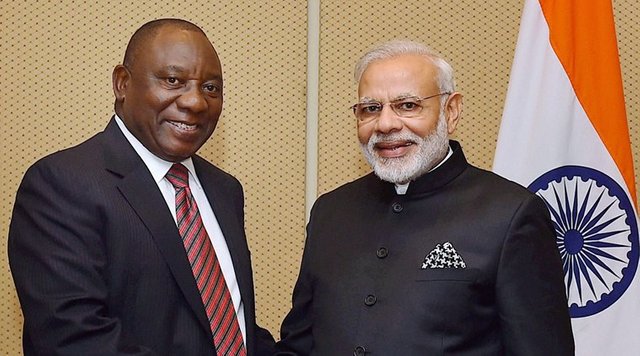India-Africa Relations
Recent Situation :
During the recent annual meeting of the Africa Development Bank at Gandhinagar, Prime Minister Narendra Modi announced the launch of India’s latest initiative in Africa, the Asia-Africa Growth Corridor (AAGC), in partnership with Japan.

Importance of Africa:
Economic
Diversifying our energy sources, which is one of the stated objective of our Integrated Energy Policy.
Blue Economy- The existence of vast natural resources, both living and non- living, in the marine ecosystem, has led to a concern about sustainability of harnessing these resources.
Africa also contains rich reservoir of valuable minerals, metals including gold and diamond.
Africa provides a space for Indian investment
Africa has vast agricultural land which cab address India’s food security. India is looking at leasing land in Africa to overcome the land deficit that we face in terms of arable land.
Geopolitical
Support of African countries is important for India’s aim of gaining a permanent seat in UNSC.
India has been actively involved in peace and stability of through UN Peace keeping operations. India is involved in capacity building of African countries.
Africa is also the largest beneficiary of India’s the Indian Technical & Economic Cooperation Programme (ITEC) programme.
Africa is critical to India’s security, especially the Horn of Africa region, because of its proximity with India.
The threat of radicalism, piracy, organized crime emerge from this region.
History of India Africa Relations:
The foundations were laid by Mahatma Gandhi. According to him, there will be a “commerce of ideas and services and not of raw materials and goods like imperialist powers”.
According to Previous Vice President Hamid Ansari, “ India shares Africa’s dreams and India Africa cooperation is genuine 2 way street partnership”.
Relations uptill 1960:
Nehru talked about Afro Asian solidarity. African countries provided strength to Nehru’s NAM. The policy in this phase is described as “ideational” and “pragmatic”.
2nd phase (1970s – 1990s):
There was neglect of Africa because of India’s attention on South Asia and India’s attention on inward looking foreign policy. Though India in this phase continued to support Africa against Apartheid.
3rd phase (1990s onwards):
This is the phase of reengagement with Africa. However the lead was taken by private sector, rather than government. Private sector of India should be given credit to push attention of GoI towards the region of strategic and economic importance.
Present status of relations:
Since 2008, India and Africa relations have been institutionalized. India has started engagement with African Union (Pan African Platform). So far 3 summits have been organized under the aegis of India Africa Forum Summit.
It is to be noted that the approach of GoI is also influenced by China. China has also initiated the Forum for Africa and China cooperation in the year 2000.
Strategies adopted by Indian government:
Pan African level engagement
Partnership with regional organization
Development partnership through IBSA and BRICS
Bilateral engagement with countries
Involving Indian communities and Indian Diaspora
India- Africa relation with respect to China
While China has been in Africa’s infrastructure, mining, oil and natural gas sectors for many years, India, despite moving late, has worked through training, education and capacity-building programmes — which have been very well-received by the countries.
China is developing series of important ports in Africa on the western and eastern coast right uptill Mediterranean and building rail linkages to connect to those ports
A Pan-African e-Network for education and health is functional in 48 countries.
Since 2008, India has extended 40,000 scholarships to African countries under ITEC programme.
Indian firms are conducting numerous takeovers abroad and are venturing into Africa.
In June 2008, Bharti Airtel, an Indian telecommunications giant, purchased Zain Africa for US$9 billion.
Challenges India faces from the presence of countries like U.S in Africa
With shale revolution in USA, trade volume has declined.
USA still involved in infrastructural development, export of commodities (food stuff, refined products), export of equipments, projects for Mineral exploration. All these fields are also what India is interested in.
USA along with China has also been offering soft loans which are being lapped up by capital starved African nations.
Indian Strength
Indian diaspora in Africa to be leveraged for involvement in building social Infracture.
Similar socio economic challenges and historical linkages
Indian developmental model more in line with Africa’s needs.Beause of Indian Democratic Political Structure just like most of the African Countries.
Private sector involvement in Africa. India’s private sector is involved in 2x more Greenfield projects as compared to Chinese counterparts. Another advantage that India has, in any projects it employs local people thereby generating employment, earning goodwill. China exports Chinese labour.
Opportunities
Shift from line of credit approach to private sector involvement which would help in providing loans at cheaper interest rate, risk mitigation
Better organized, more coherent and faster responding mechanism accompanied by an appropriate media campaign required for highlighting India’s contribution
Congratulations @yatintanwar! You received a personal award!
You can view your badges on your Steem Board and compare to others on the Steem Ranking
Vote for @Steemitboard as a witness to get one more award and increased upvotes!